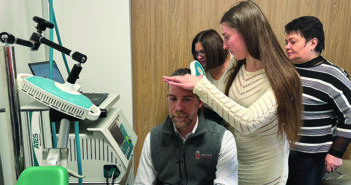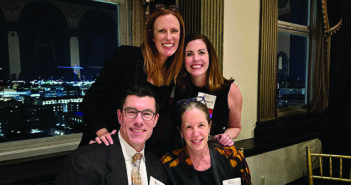‘Return to play’ has broader meaning for artists.

Amity Rubeor, DO RES’05, the first physician in Rhode Island to receive certification in performance medicine.
Performing artists have much in common with athletes, Amity Rubeor, DO RES’05 says. Their activities result in specific types of injuries and strains—tennis elbow, in the case of the violinist who practices three hours a day, or Achilles tendonitis in the dancer—and they are just as eager to return to play as the football player who’s suffered a concussion.
“Their identity is wrapped up in it,” she says.
Rubeor is the first physician in Rhode Island to receive certification in performance medicine, an expertise centered on the specialized musculoskeletal issues of musicians and dancers. Performance medicine is a natural offshoot of her practice at Care New England’s Affinity Sports Medicine.
Rubeor treats many concussions, and says it’s important to consider the role that other activities play in “return to play” strategies. “I had a young hockey player who was also in the band,” she says. “I realized that he shouldn’t play the tuba while he was recovering from a concussion, because of high pressure required to play that instrument.”
That was one of her earliest insights into the medical needs of performers, and it was confirmed by observations of her daughter’s dance classes, and the particular types of injuries to which dance students are prone. She pursued her interest by taking a workshop on performance medicine with the American College of Sports Medicine, and followed that up in July 2016 by earning certification from the Performing Arts Medical Association.
For Rubeor, this focus on performance medicine isn’t just a desire to treat a specific type of patient using specialized skills; it’s a tool for understanding important dimensions of the patients she already has in her practice. For example, one patient who had been struggling with intractable back pain after a car accident is a music teacher who plays the saxophone. “I have to think about her posture and how she holds her sax. I have to balance what I want to see a musician do as far as posture and behavior, with what they have been taught to do and have been doing for years,” she says.
“Before I took the course, I might have told a violin student, ‘Just don’t play for two weeks,’” Rubeor adds. “But now I realize that they can’t. Performance matters so much in their lives.” Now she gives performing artists and athletes the same reassurances: “I’m going to get you back to doing what you love and need to do as quickly as possible, but I’m going to take into account what that is doing to your body. We are going to try to make that work.”



